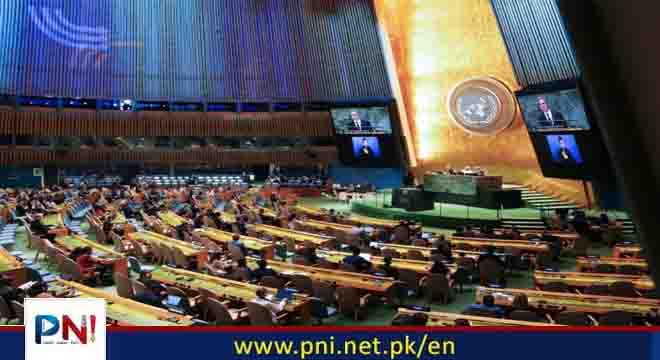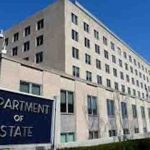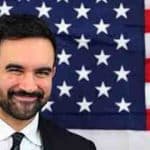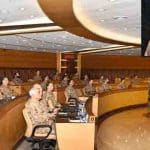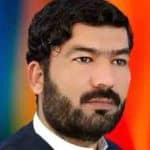UNITED NATIONS, Dec 10 : Speakers at a high-level event Monday called for the implementation of the recommendations made in a series of youth-related resolutions adopted by different organs of the UN so that youth leadership can be integrated into global diplomatic efforts and conflict resolution.
The call was made at a panel discussion, organized by Pakistan Mission to the UN and Global Peace Chain Foundation, which is dedicated to fostering a culture of peace worldwide.
With the world facing multiple conflicts that threaten global peace and stability, the speakers said that youth leaders, with their new ideas and dynamic energy, could play a pivotal role in peace negotiations and conflict resolution.
Participating in the meeting were UN Assistant Secretary General for Youth Affairs, Dr. Felipe Paullier; Acting Permanent Representative of Pakistan to the UN, Ambassador Usman Jadoon; Permanent Representative of OIC Observer Mission, Ambassador Hameed Ajibaiye Opeloyeru; Deputy Permanent Representative of China, Ambassador Geng Shuang; Deputy Permanent Representative of Observer Mission of Palestine, Ambassador Ms. Feda Abdelhady; Deputy Permanent Representative of Turkiye, Ambassador Mrs. FikriyeAsli Guven; Deputy Permanent Representative of Azerbaijan Tofig Musayev and a Youth Advocate, Usman Amjad.
The discussion on “Youth Leadership and Global diplomacy was moderated Moderated by Saima Saleem, Counsellor at the Pakistan Mission and Mohammad Ahmad, co-founder and and Director of the Global Peace Foundation. Concluding remarks were delivered by Kamran Zafar, CEO of the Global Peace foundation.
The well-attended event took place in the spacious Trusteeship Council chamber.
In his keynote address, Dr. Paullier, the assistant secretary-general for Youth Affairs, briefed the delegate about the activities of his newly-formed office, saying he was exploring the potential for collaborative approaches and partnerships among youth, diplomats, and international organizations in addressing global conflicts.
The effort was aimed at empowering a new generation of leaders to take an active role in shaping a peaceful and prosperous world.
“Peace is not a destination, but is a journey, a journey that must include the voices, the energy and the innovation of young people only, together, we are going to be able to transform today challenges into opportunities that really allow us not only to work for young people, but to work with young people,” Dr. Paullier added.
Ambassador Jadoon, Pakistan’s acting permanent representative, said that while The United Nations has already recognized Youth’s potential through various resolutions, there remains much to be done to integrate their voices meaningfully into global diplomacy.
“Today is a somber moment for us that despite passage of more than seven decades, Palestine and Jammu and Kashmir dispute remains unresolved and millions of young people are made to live under the brutal yoke of foreign occupation and alien domination,” he said, while pointing out that these two protracted conflicts are emblematic of the failures of traditional approaches to conflict resolution and highlight the urgent need for innovative, inclusive, and youth-driven strategies.
“In these challenging times, the youth of Kashmir and Palestine stand as symbols of resilience and hope for a better tomorrow,” the Pakistani envoy said. Despite decades of occupation, suppression, and denial of basic rights, young people in these regions continue to advocate for their rights through peaceful means, using education, technology, and creative expression to draw the world’s attention to their plight.
“Their courage must inspire us to integrate their voices into global decision-making processes,” Ambassador Jadoon told delegates.
Conflict resolution, he said, must be underpinned by the principles of equity and respect for international law.
“For decades, the people of Kashmir and Palestine have waited for the implementation of UN resolutions that affirm their right to self-determination. Youth, as agents of change, can play a pivotal role in bridging divides and reinvigorating diplomatic efforts to fulfill these commitments,” the Pakistani envoy said.
Pakistan, he said, remains steadfast in its commitment to supporting the aspirations of the youth in Kashmir and Palestine.
“Let us ensure that their voices are not just heard but amplified, their dreams not just acknowledged but realized. Together, let us lay the groundwork for a peaceful and equitable future where every young person—no matter where they are born—has the opportunity to shape a better world,”Ambassador Jadoon said in conclusion.
Ambassador Geng of China led the chorus for the implementation of a range of UN resolutions, declarations, statements and action plans that recognize the importance of youth in peace-building and conflict resolution. In this regard, he cited the key UN Security Council resolution entitled youth, peace and security (YPS).
“So I think here the key word is we have enough commitment and talking Now it’s really time to do the real job and to do the implementation,” the Chinese envoy said.
“We should let the youth, the young people of different countries, engage with each other to enhance their mutual understanding and mutual trust, and which could lay a solid foundation for the sustainable peace and security.”
Ambassador Feda Abdelhady of Palesstine said that an entire young generation of Palestinians is struggling, not only to be seen and heard, but struggling to survive in the face of unprecedented crisis and tragedy that as also been a testament to their historic resilience.
Depicting the dire situation since Oct 7, 2023, Israeli genocidal war, she said the horrors that have unfolded in the Occupied Palestinian territory, including East Jerusalem, makes more apparent than ever that the ‘Nakba’ against the Palestinian people has never ended, and none have suffered more painfully and traumatically than people currently in Gaza.
The Palestinian envoy called on all states to uphold their obligations under international law and the lofty commitments made to youth in successive resolutions and declarations, most recently, the Pact for the Future, make good on the pledges to youth, including Palestine youth, do not abandon them to suffer this grave injustice any longer, and do not sacrifice their present and the future together.
“We must act to uphold our collective humanity and to ensure respect for the inalienable rights and act for accountability,” she added.
Ambassador Guven of Turkiye said that young people were using innovative methods that often bypass the constraints of conventional diplomacy, with their ability to bridge the divides. And fostering dialogue within fractured communities, was a testament to their potential as transformative agents of peace.
“Young people are one of the main stakeholders in peace, simply because children and young people bear the brunt of conflicts and instability –as we have witnessed in Gaza, in Kashmir and elsewhere,” she said.
“The challenges we face today, indeed, ranging from persistent conflicts to climate change, require not only political will, but also open mindedness, fresh ideas and out-of- the-box thinking,” the Turkish envoy said.
On his part, Youth Advocate, Usman Amjad called for increasing youth participation in policy-making.
“Let me begin with the fundamental truth today: youth are not just the leaders of tomorrow. They are the change-makers of today,” he said.
“With over 1.8 billion people aged between 10 and 24, we form the largest generation of youth in history,” Amjad added.
A question-answer segment followed.
All the panelists praised Pakistan’s initiative to discuss what they called was an important subject– involving youth in diplomacy for peace and stability.
Follow the PNI Facebook page for the latest news and updates.


